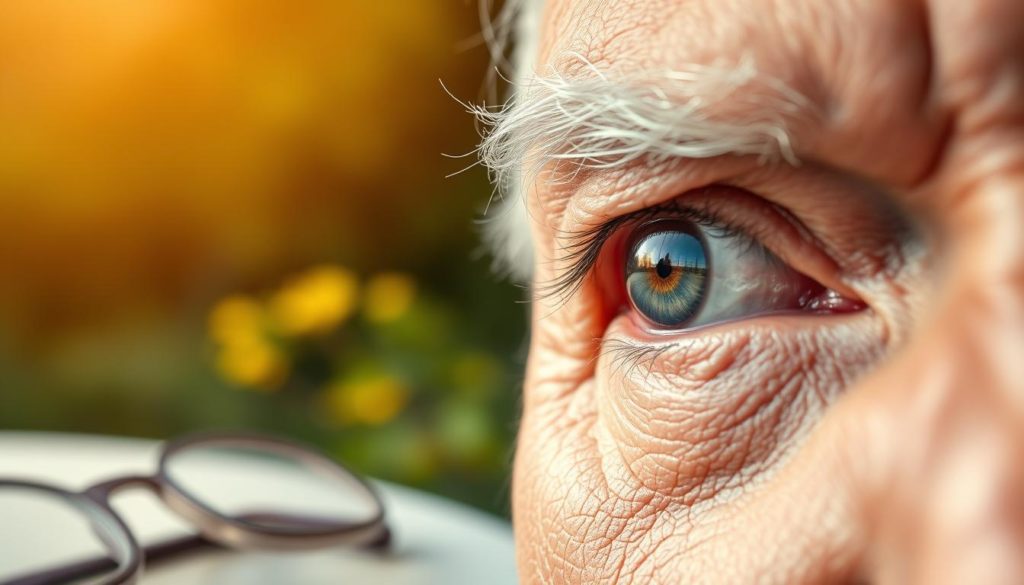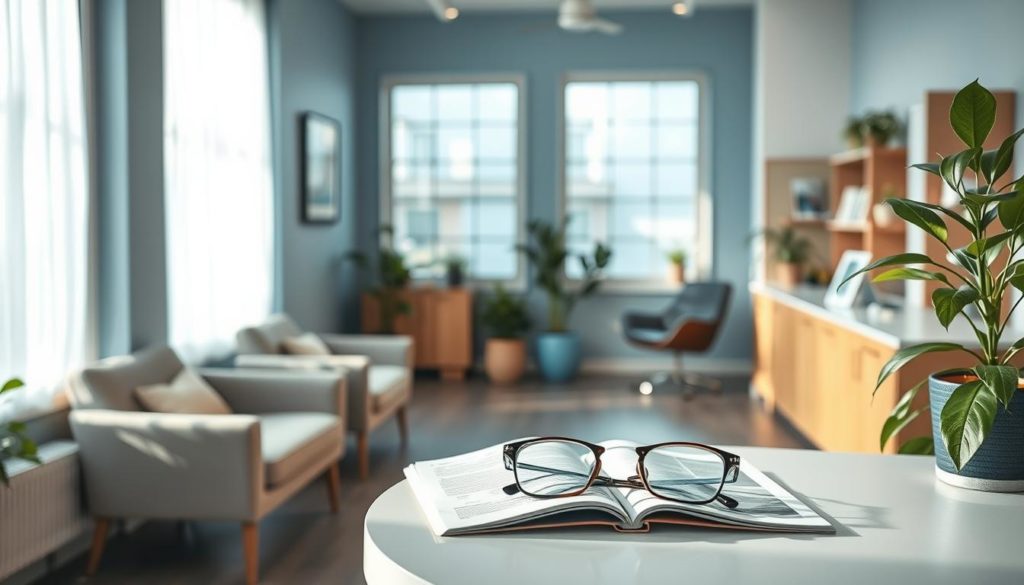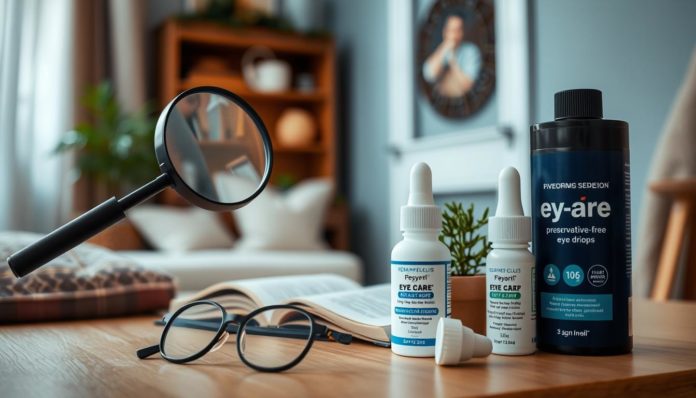Did you know that by age 65, one-third of Americans face vision-reducing eye diseases? Our eyes change a lot as we get older. This affects our daily life and overall health. These changes, like trouble seeing up close or difficulties with colors, are common but we can manage them.
It’s crucial to care for your eyes as you age. Having regular eye exams helps catch problems early. This keeps your vision sharp. Also, using good lighting and wearing correct glasses or contacts can improve life a lot.
Knowing about senior vision care is key to protecting your sight. If you’re noticing small changes in your vision or if you have health issues like diabetes or high blood pressure, getting expert advice on eye care is very helpful.
Understanding Age-Related Vision Changes
As we get older, our eyes naturally begin to change. It’s important for many older people to see their eye doctor often. They must keep an eye on their everyday habits too. Knowing what’s normal and what needs a doctor’s care is key.

Common Vision Changes in Seniors
Over time, many folks run into typical vision issues like presbyopia, trouble seeing in dim light, and glare being more bothersome. Even though we can usually handle these problems, they can make things like reading, driving, and recognizing people harder. Understanding these changes helps us deal with them better.
Why Regular Eye Exams are Crucial
Getting your eyes checked often is very important for older adults. Experts say to get a thorough eye exam every year if you’re over 50, and every two years after turning 60. These exams help with keeping your glasses or contacts right and spotting big problems early, like cataracts, glaucoma, and AMD.
| Age Group | Recommended Exam Frequency | Conditions to Monitor |
|---|---|---|
| 50-60 years | Every 1-2 years | Presbyopia, Cataracts |
| 60+ years | Annually | Glaucoma, AMD, Diabetic Retinopathy |
| With Diabetes or Hypertension | As advised by doctor | Diabetic Retinopathy, High Blood Pressure-related issues |
Being proactive about your eye health as you age is smart. Following these tips can help find and treat problems early. This keeps your vision sharper, making life better.
Preventive Eye Care for Seniors
Taking care of our eyes gets more important as we grow older. Getting into preventive eye care for seniors greatly cuts down the risk of losing vision and other eye problems.

Importance of Early Detection
Finding eye diseases early through regular eye exams is key for seniors. Catching issues like glaucoma or cataracts early allows for treatments. These can often slow down or even improve vision problems. This helps keep eyes healthy and improves life quality.
Maintaining a Healthy Lifestyle
Regular eye exams are just one piece of the puzzle. Lifestyle choices are also critical in keeping vision clear. Seniors should wear sunglasses that block UV rays to protect their eyes from the sun. Stopping smoking, eating a diet full of leafy greens and omega-3s, and controlling conditions like diabetes and high blood pressure are essential.
Focusing on these areas helps seniors prevent common vision issues and maintain good eye health as they age.
| Preventive Measures | Benefits |
|---|---|
| Regular Eye Exams | Early detection of eye diseases |
| UV-Blocking Sunglasses | Protection against harmful rays |
| Balanced Diet | Nutrition for eye health |
| Managing Diabetes and Blood Pressure | Reduced risk of associated vision problems |
Common Age-Related Vision Problems
As we get older, our eyes face unique challenges. Spotting these issues early can make a big difference in handling them.
Age-Related Macular Degeneration (AMD)
AMD is a main cause of losing vision in older adults. It affects the part of your eye needed for seeing fine details. Catching it early and watching it closely is key to keeping it in check.
Diabetic Retinopathy
If your blood sugar stays high, it might lead to diabetic retinopathy. This condition harms the eyes’ blood vessels and can cause blindness. It’s really important for people with diabetes to get their eyes checked often.
Glaucoma
Glaucoma harms your optic nerve, which can make you lose your sight. It doesn’t show signs until it’s pretty advanced. To catch and manage it early, getting your eyes checked regularly is crucial.
Cataracts in the Elderly
Many older people develop cataracts, which blur their vision. At first, better lights and glasses can help. But sometimes, an operation is needed to see clearly again.
| Vision Problem | Symptoms | Treatment Options |
|---|---|---|
| Age-Related Macular Degeneration | Central vision loss | Monitoring, medications, lifestyle changes |
| Diabetic Retinopathy | Blurry vision, dark areas | Blood sugar control, laser treatment |
| Glaucoma | Peripheral vision loss | Medications, surgery |
| Cataracts | Cloudy vision | Eyeglasses, surgery |
Improving Vision in Older Adults
Getting older sometimes means our vision gets blurry. But, good news – there are ways to make it better! Seniors can boost their seeing with glasses or surgery.
Corrective Lenses
Glasses really help seniors see clearly every day. Getting eyes checked often means they have the right glasses. This makes everyday activities like reading, driving, or just seeing clearly much better.
Surgical Options
Sometimes, glasses aren’t enough. Then, surgery might be the answer. One of the most common surgeries is for cataracts. It’s really effective for older people.
This kind of surgery doesn’t just fix vision. Many times, it actually makes it better! Thanks to it, many seniors get to live more fully, doing things they love.
Senior Eye Health Tips
Maintaining good vision is key for seniors. Simple steps can greatly improve eye care.
Diet and Nutrition
Eating right is crucial for senior vision health. Include antioxidant-rich foods like leafy greens and carrots to help your eyes. Drinking plenty of water keeps your eyes moist and comfortable. Also, adding Omega-3 rich fish, such as salmon, fights dry eyes.
Physical Activity
Staying active is good for your whole body, including your eyes. Exercise improves blood flow to the eyes. Consider walking, yoga, or swimming to support your overall and eye health.
Avoiding Smoking
Not smoking is important for your eyes. Smoking can lead to serious eye diseases like AMD and cataracts. Quitting smoking improves your eye health a lot. Ask doctors for help to stop smoking.
| Aspect | Benefits |
|---|---|
| Antioxidant-rich diet | Prevents age-related eye diseases |
| Regular exercise | Improves blood circulation to the eyes |
| Avoiding smoking | Reduces risk of AMD and cataracts |
Senior Vision Health
It’s key to know and meet the vision needs of seniors to keep their life quality high. Regular senior vision check-up appointments are vital. They find problems early for quick treatment. Knowing more about eye health awareness helps seniors protect their sight.
Getting to eye care easily matters a lot for senior vision health. This means having tests, treatments, and help paying for them. It’s crucial to use these resources so seniors get the eye care they need.
- Schedule annual senior vision check-up appointments.
- Promote eye health awareness through educational campaigns.
- Investigate local resources for affordable eye care.
- Consider financial aid options for necessary treatments.
Let’s look at key eye care services for seniors:
| Service | Description | Potential Cost Assistance |
|---|---|---|
| Comprehensive Eye Exam | Thorough examination of vision and eye health | Medicare, Medicaid, and private insurance |
| Glaucoma Screening | Tests to detect glaucoma early | Medicare covers annually for high-risk groups |
| Cataract Surgery | Surgical procedure to remove clouded lens | Partially covered by Medicare |
Seniors can choose wisely about their eye care by knowing these things. This leads to better vision and a higher quality of life.
Managing Dry Eyes in Seniors
Dry eye syndrome is a common problem among seniors. It can really affect their day-to-day life. Learning about this condition and treatment choices is key. Seniors might feel a stinging, burning, or a gritty sensation in their eyes.
Understanding Dry Eye Syndrome
Dry eye syndrome happens when eyes don’t make enough tears or they dry up too fast. This causes irritation and discomfort. Aging, hormone changes, and certain meds can lead to it in older adults. Finding the root cause is important for managing it well.
Treatment and Management Options
There are many ways to treat dry eyes. For simple cases, over-the-counter eye drops can help right away. But, tougher cases may need prescription meds or even tear duct plugs. Making lifestyle changes like drinking more water and using humidifiers can also make a big difference.
| Type of Treatment | Purpose |
|---|---|
| Artificial Tears | Provide immediate moisture |
| Prescription Medications | Reduce inflammation |
| Tear Duct Plugs | Prevent tear drainage |
| Lifestyle Changes | Increase natural moisture |
Getting to know about dry eye syndrome in seniors and checking out different treatment methods helps. This way, finding the right treatment for dry eyes becomes easier. It’s wise to talk to an eye doctor to figure out the best plan for managing dry eyes.
Vision Care for Seniors with Chronic Conditions
As they get older, seniors face challenges managing chronic conditions and maintaining their eye health. Conditions like diabetes and high blood pressure have a big impact on vision. We’ll look at how these affect vision and why eye care is so important.
Impact of Diabetes on Vision
Diabetes poses a big threat to the vision of older people. It can cause diabetic retinopathy, harming the retina’s blood vessels. To catch diabetes’ effects on vision early, getting regular eye exams is crucial. Keeping blood sugar in check also lessens the risk of serious eye problems.
Managing High Blood Pressure
The effects of high blood pressure on eyes are serious too. It can cause hypertensive retinopathy by damaging the retina’s blood vessels. This might lead to vision loss if left unchecked. It’s vital for seniors to keep their blood pressure under control. Following doctor’s advice and lifestyle changes are key to protecting eyes.
| Chronic Condition | Possible Eye Impact | Suggested Action |
|---|---|---|
| Diabetes | Diabetic Retinopathy | Regular eye exams, controlled blood sugar levels |
| High Blood Pressure | Hypertensive Retinopathy | Monitor BP, adhere to medications |
For seniors with chronic issues, focusing on eye care is crucial. Being aware of vision changes and going for regular check-ups can prevent problems from diabetes and high blood pressure. Taking care of both, your overall health and your eyes is very important.
Assistive Devices for Low Vision
Seniors with low vision can greatly benefit from using various devices and technologies designed to enhance their visual capabilities. These assistive tools play a crucial role in improving daily activities and maintaining independence.
Examples of Assistive Devices
There are many low vision aids to support seniors. They include:
- Spectacle-mounted magnifiers
- Handheld telescopes
- Video magnification systems
Each device is made to meet specific vision needs. This makes it easier for individuals to read, watch television, or do everyday tasks.
Benefits of Vision Rehabilitation
Vision rehabilitation programs offer many benefits. They teach seniors to use low vision aids effectively, maximizing their sight. This helps them adjust to their surroundings.
Not only do these programs help with independence, but they also better the quality of life.
| Assistive Device | Key Benefit |
|---|---|
| Spectacle-mounted magnifiers | Hands-free magnification for reading and detailed tasks |
| Handheld telescopes | Increased distance viewing capability |
| Video magnification systems | Enhanced image clarity and contrast for visual media |
Signs It’s Time to See an Eye Care Professional
Aging eyes need more care and watchfulness. Knowing when to see an eye expert is key for catching and treating vision problems early. It’s important to be aware of the signs for good eye health.
Emerging Symptoms to Monitor
Seniors should watch closely for any new or getting worse vision changes. Don’t ignore symptoms like blurry or distorted vision, or suddenly not being able to see. Seeing floaters and flashes of light can mean serious issues are present. It’s critical to check these symptoms often and talk to an eye expert.
Urgent Vision Issues
Some eye problems need quick emergency eye care. If you have sudden bad eye pain, redness, swelling, or quick vision changes, get help right away. Getting emergency help can stop more problems and keep your eyes healthy.
Preventing Eye Injuries at Home
Eye injuries can increase for seniors due to their changing vision. Knowing how to make homes safer is key. Simple steps, like adding non-slip mats and fixing loose handrails, help a lot. Putting in better lights and motion sensors in key spots also keeps seniors safe.
Home Safety Tips
Keeping homes safe is crucial, especially for seniors. Making sure furniture has no sharp corners can prevent eye injuries. Be careful with household chemicals to avoid splashes to the eye. Doing these things can lessen risks. It’s good to check for hazards at home, ensure good lighting, and keep walkways clear.
Using Protective Eyewear
Wearing the right eyewear is key to preventing eye injuries. This is true for gardening, DIY projects, or cleaning. Use sunglasses that block UV rays for outdoor tasks. And don’t forget safety goggles for sports. By wearing protective glasses regularly, you can keep your eyes safe. For more tips on eye protection, check out Hopkins Medicine.
FAQ
What are common vision changes in seniors?
As we get older, seeing things up close, spotting colors, and adjusting to light can get hard. Glasses, contact lenses, and better lighting usually help. It’s very important to have regular eye check-ups to catch and treat serious issues early on.
Why are regular eye exams crucial for senior vision care?
Regular check-ups are key for finding and dealing with serious eye problems early. Issues like AMD, diabetic retinopathy, and glaucoma need to be caught quickly. Doctors say people over 50 should get their eyes checked every year. After 60, every other year, unless they have diabetes or high blood pressure. These exams help keep vision sharp and maintain independence.
How can seniors prevent vision problems?
Getting eyes checked often is very important. Wearing sunglasses that block UV rays, not smoking, eating foods rich in antioxidants, and controlling health problems like diabetes and high blood pressure also help protect eyesight.
What are the symptoms of age-related macular degeneration (AMD)?
AMD messes with the middle part of your vision, which you need for driving and reading. If things look warped, recognizing faces gets hard, or seeing in dim light becomes tough, it could be AMD. Getting eyes checked often is critical to handle this problem.
How can cataracts be treated in the elderly?
Cataracts make your vision blurry and can get worse over time. Usually, surgery fixes them well. Spotting cataracts early through regular eye exams means getting the right treatment sooner.
What lifestyle choices can support senior eye health?
Eating well, staying active, not smoking, and taking care of your overall health are all vital. They help keep your eyes healthy as you age.
How can seniors manage dry eye syndrome?
Dry eyes can feel itchy, burn, or like something’s in them. Artificial tears, specific drugs, or even small procedures can provide relief.
How do chronic conditions like diabetes and high blood pressure affect vision?
Not controlling diabetes can cause a condition that might lead to blindness. High blood pressure can harm eye blood vessels, causing vision issues. Staying on top of these conditions and having regular eye exams are essential to avoid problems with sight.
What assistive devices are available for seniors with low vision?
There are tools to help seniors with poor vision enjoy a better quality of life. Things like glasses with special magnifiers, portable telescopes, or electronic devices that enlarge text. Learning to use these aids through vision rehabilitation can help keep independence.
When should seniors see an eye care professional?
If vision gets blurry, changes, or if there’s pain, swelling, or redness, it’s time to see a doctor. Also, seeing floaters or flashes means you should get checked right away. These signs can mean a serious problem that needs quick attention.
How can eye injuries at home be prevented?
To avoid hurting your eyes at home, use non-slip mats and make sure stair railings are sturdy. Better lighting and motion-sensor lights help too. Wearing safety glasses during DIY projects is also a smart move. These steps can greatly lower the risk of eye injuries.


